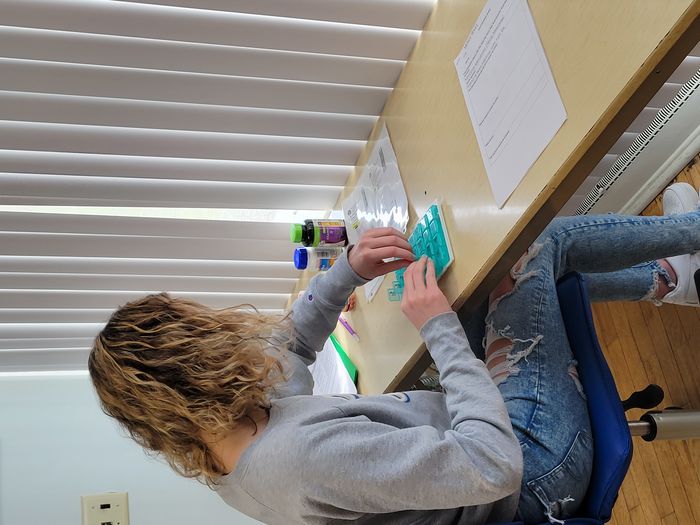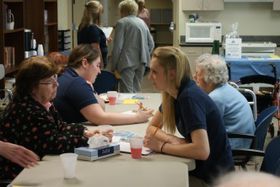Update: Penn State DuBois is not currently enrolling new students. Current students can access academic advising and degree planning through campus services.
Program Spotlight with Dr. J: Occupational Therapy Assistant
Consider our Occupational Therapy program if...
You want to prepare to be an occupational therapy assistant who is qualified to be employed by agencies that provide occupational therapy services. Think about what it's like to be physically or emotionally challenged to the extent that just living everyday life seems almost impossible. Then think about how you can make a difference in that life. If the thought of making a difference while earning a great living appeals to you, come to Penn State DuBois to obtain your Associates in Occupational Therapy. The United States Bureau of Labor Statistics indicates that the growth rate for the profession is much faster than the average for all professions.
#1 job in Best Health Care Support Jobs by U.S. News and World Report
Occupational therapy assistants earned a median salary of $56,950 in 2014, according to the Bureau of Labor Statistics, with the lowest-paid making $36,420 and the highest paid making upward of $76,790. The BLS expects a huge increase in this profession of 43 percent by 2024, which translates to about 14,000 new jobs.
The American Staffing Institute’s 2014 list of the top 10 jobs noted that occupational therapy assistants were number 4 in the top 10 jobs in demand by employers in the United States (American Staffing Institute, 2015).
Careers for Occupational Therapy program graduates
Certified Occupational Therapy Assistants (COTA's) work in a variety of settings, under the supervision of occupational therapists. Young or old, we all have a job to do--the job of living. Learning, growing, playing, working, managing our homes, and caring for our families and ourselves are among the "occupations" of life. Sometimes physical, emotional, or other challenges prevent people from participating fully in the job of living. Stroke, injury, depression, and developmental disabilities, for example, can make it difficult for people to do everyday tasks or be as active and as independent as they'd like. Occupational therapy makes it possible for people to regain independence and to enjoy life to its fullest. By choosing a career in occupational therapy, you will make a difference. You will improve the lives of children, young people, and adults alike. Following graduation, students are eligible to take the National Board for Certification in Occupational Therapy (NBCOT) exam.
You may access the direct link for the NBCOT Accredited Occupational Therapy Education Program Performance Data on the NBCOT National Certification Exam
Career Opportunities for a graduate with an associate degree in occupational therapy may include working in public and private schools, early intervention programs, general, psychiatric, and pediatric hospitals, day treatment centers, hospices and home health agencies, rehabilitation hospitals and centers, skilled and intermediate care facilities, community living programs, community wellness centers, work hardening and adjustment programs, and/or hand therapy clinics.
The Occupational Therapy Assistant Program is accredited by the Accreditation Council for Occupational Therapy Education (ACOTE) of the American Occupational Therapy Association (AOTA) through the 2033-2034 academic year. ACOTE is located at 7501 Wisconsin Avenue, Suite 510E, Bethesda, MD 20814. ACOTE's telephone number, c/o AOTA, is (301) 652-AOTA, and its web address is www.acoteonline.org.
For more information contact LuAnn Demi Delbrugge, Program Director of the Occupational Therapy Assistant program.
Remember, all programs are not the same. Check out the Penn State difference! Penn State Associate in Science in Occupational Therapy graduates are eligible to sit for the National Board for Certification in Occupational Therapy (NBCOT®) Certification exam. Successful completion of this exam certifies the occupational therapy assistant as a COTA®. State licensure is required by all states and is usually based on the results of the NBCOT® certification exam.
What would prohibit a student from taking the certification exam?
If you have a felony conviction on your record, this may affect your ability to sit for the certification examination administered by NBCOT® after you graduate; this can subsequently affect your ability to attain state licensure. Before applying for the OTA program, you can contact NBCOT® for information on their early determination program to assess examination eligibility. Go to NBCOT and read the "Early Review" section for details.
COVID19 and Academic Fieldwork:
In light of COVID19, many fieldwork sites are requiring students to be fully vaccinated in order to be on the premises. If you are not fully vaccinated, the academic fieldwork coordinator may not be able to place you on fieldwork in a desired geographic location or setting within the prescribed semester. Not being vaccinated may delay your graduation from the OTA program.
Professional Licensure and Certification Compliance
Many US states and territories require professional licensure/certification to be employed. If you plan to pursue employment in a licensed profession after completing this program, please visit the Professional Licensure/Certification Disclosures by State interactive map.
Professional Organizations
The American Occupational Therapy Association, Inc. (AOTA)
7501 Wisconsin Avenue, Suite 510E
Bethesda, MD 20814
Phone: 1-800-SAY-AOTA (1-800-729-2682)
http://www.aota.org/
National Board for the Certification of Occupational Therapy, Inc. (NBCOT)
One Bank Street
Suite 300
Gaithersburg, MD 20878
Phone: 301-990-7979
Fax: 301-869-8492
http://www.nbcot.org/

